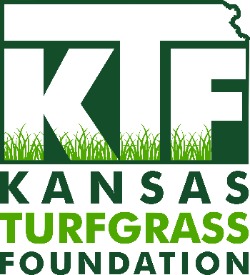Turf Diagnostic Guide: Troubleshooting Kansas Lawn Problems
Home Lawns, Athletic Fields, and General Turf
Ned Tisserat, Steve Keeley, and Rodney St. John
Department of Plant Pathology and Division of Horticulture Kansas State University
Some lawn problems are relatively simple to diagnose, while others are more complex and may require a specialist, or a laboratory analysis. The diagnostic process involves asking the pertinent questions, making appropriate observations, and knowing what to expect on each species during the course of the year. This guide is designed to help turfgrass managers in this process. Problems are grouped based on the season in which they occur, so that the range of possibilities is narrowed as much as possible. The guide is intended primarily for those involved in the care and management of home lawns, athletic fields, commercial grounds and parks; therefore, it does not include problems that occur primarily on bentgrass putting greens. However, the golf course manager should find it helpful for diagnosing problems occurring on tees, fairways, and roughs.
Keep in mind that two or more problems may be present concurrently in a turfgrass stand. For example, poor watering practices during the summer can cause drought stress, which may predispose the turf to certain diseases or make it more susceptible to insect damage. Always try to determine the underlying cause of a lawn's problem(s); sometimes chemical controls are necessary, but in many cases an adjustment in cultural practices can prevent or minimize future problems.
Note: Unless otherwise noted in the descriptions below, assume the problem can occur on all turfgrass species grown for lawn use in Kansas.
Problems appearing in winter to very early spring
Irregular patterns or streaks in turf
- Bleached or dead grass, usually all grass in affected area is killed (damage may not be apparent until spring)........WINTER DESICCATION
- New leaves bleached or yellow after sudden temperature shift........SPRING FROST
- Emerging leaves develop silver tinge; often under trees; resembles winter dessication
- Orange-legged mites hide in thatch during sunny periods; primarily a problem of cool-season grasses........WINTER GRAIN MITE
- Damage concentrated within 6 feet of sunny sides of buildings, trees, and shrubs; dark green mites with reddish legs often observed crawling up sides of buildings; primarily a problem of cool-season grasses........CLOVER MITE
Circular patches scattered in turf
Patches 2-12 inches, often with pink color at margin........PINK SNOW MOLD
Problems appearing in early to mid-spring and/or in the fall
Irregular to roughly uniform patterns in turf (not patches), fungal growth evident (mycelium, spores, etc.)
- Powdery white growth on leaf surface, leaf yellowing, most common on Kentucky bluegrass........POWDERY MILDEW
- Turf yellow, thin, gray to black sooty stripes on leaves, leaves tend to split and curl back, most common on Kentucky bluegrass, may occur on ryegrass, bermudagrass, buffalograss........LEAF SMUT, STRIPE SMUT, OTHER SMUTS
- Turf yellow, leaves with yellow, red or brown pustules........RUST
- Pink to red fungal growth on leaf surface........PINK PATCH / RED THREAD
Irregular to roughly uniform patterns in turf with no fungal growth evident (mycelium, spores, etc.)
- Leaf spots distinct with sharp margins, purple to black initially, may have gray to white centers, but usually with purple to black margins; yellow halo surrounding leaf and crown lesions; primarily affects ryegrass and Kentucky bluegrass........MELTING OUT
- Leaf spotting irregular, more of a blotching or necrotic mottling, small black fruiting bodies evident in lesions, more common on older leaves........ASCHOCHYTA / SEPTORIA LEAF SPOT
Circular patches in turf
- Rings up to 20 feet or more in diameter, often with outer ring of dark grass, grass in ring may be killed........FAIRY RING
- Patches up to 20 feet or more in diameter in zoysiagrass; patches develop in fall and reappear in spring (April, May), margins of patches develop bright orange color, irregular lesions with brown margins visible on lower leaf sheaths and crowns........RHIZOCTONIA LARGE PATCH
- Patches or rings in bermudagrass as turf breaks winter dormancy; roots discolored black and heavily rotted, patches reappear in same location each year........SPRING DEAD SPOT
Problems appearing in late spring to early summer
Irregular patterns in turf, fungal growth evident (same as described under "II.A")
Irregular patterns in turf, no fungal growth evident; few to no lesions visible on leaves; turf may pull up easily from crown
- Leaves often "clipped" off at ground level; silk-lined tunnels may be visible; green frass (droppings) in or near the tunnels........SOD WEBWORM
- Leaves often "clipped" off at ground level; no silk-lined tunnels........CUTWORM
- Torn, ragged appearance to leaves from foliar feeding........ARMYWORM
Irregular patterns in turf, no fungal growth evident; many lesions evident on leaves; turf may not pull up easily from crown
Leaf spots distinct with sharp margins, purple to black initially, may have gray to white centers, but usually with purple to black margins, yellow halo surrounding leaf and crown lesions; mainly affects Kentucky bluegrass, bermudagrass, and ryegrass........BIPOLARIS AND DRECHSLERA LEAF SPOTS
Circular patches in turf
- Patches 2-6 inches in diameter; leaf lesions bleached light tan to white and bordered by dark brown to purple margins; lesions typically appear in the middle portion of leaf........DOLLAR SPOT
- Patches 2-6 inches in diameter, gray, yellow or pink fungal mass on the surface of the foliage, washes off easily and is not attached to leaves........SLIME MOLD
Problems appearing in early to mid-summer
Irregular patterns in turf; turf may pull up easily from crown or root
- Spotty patches of yellowing to dead grass; masses offine, sawdust-like frass visible near the crown of plants; the legless grubs initially feed inside the stem, so they are not visible; as they mature, they leave the stem and feed externally near the crown; Kentucky bluegrass and zoysiagrass primarily affected........BILLBUG GRUB
- Spotty patches of yellowing to dead grass; turf root system severed, may pull up like a carpet if infestation severe; raster (last abdominal segment of grub) with two rows of fine hairs........"THREE YEAR" WHITE GRUBS (MAY BEETLE/JUNE BUG)
Irregular patterns in turf; turf does not pull up easily from crown or root
Turf turning bluish-gray and wilting; footprints remain visible in lawn for several minutes after walking across lawn; in advanced stages the lawn turns brown, going dormant........DROUGHT STRESS
Problems appearing in mid- to late summer
Irregular patterns (not distinct patches) in turf; few to no lesions visible on leaves; turf may pull up easily from crown or root
- Leaves often "clipped" off at ground level; silk-lined tunnels may be visible; green frass (droppings) in or near the tunnels........SOD WEBWORM.
- Leaves often "clipped" off at ground level; no silk-lined tunnels........CUTWORM. Torn, ragged appearance to leaves from foliar feeding........ARMYWORM.
- Spotty patches of yellowing to dead grass; turf root system severed, may pull up like a carpet if infestation severe:
- raster (last abdominal segment of grub) with two rows of fine hairs........"THREE YEAR" WHITE GRUBS (MAY BEETLE/JUNE BUG)
- raster with scattered hairs (not in rows)........ANNUAL WHITE GRUB (CHAFER)
- Turfgrass turns yellow, then dies during hot, dry periods; damage may resemble drought injury; thorough inspection of the crown area and the soil surface reveals numerous red nymphs, along with larger dark-colored nymphs and adults; primarily found on zoysiagrass and buffalograss, less frequently on bluegrass and bermuda........CHINCH BUG.
Irregular patterns (not distinct patches) in turf; few to no lesions visible on leaves; turf does not pull up easily from crown or root
Turf turning bluish-gray and wilting; footprints remain visible in lawn for several minutes after walking across lawn; in advanced stages the lawn turns brown, going dormant........DROUGHT STRESS.
Irregular patterns (not distinct patches) in turf; many lesions evident on leaves
Lesions gray to brown with brown or purple margin; primarily late summer and early fall; large areas may die rapidly; ryegrass only........GRAY LEAF SPOT
Roughly circular patches
- Spots about 1-3 inches, developing rapidly; leaves initially copper-colored, eventually matted and tan; white cottony growth sometimes associated with spots; primarily a ryegrass disease........PYTHIUM BLIGHT.
- Spots one to several feet in diameter, developing rapidly during hot, humid weather; leaf blades bleached with lesions often bordered by brown bands; margins often have purple appearance; most common on tall fescue and ryegrass........RHIZOCTONIA BROWN PATCH.
- Rings up to 20 feet or more in diameter, often with outer ring of dark grass, grass in ring may be killed........FAIRY RING.
- Frogeye type patches 1-2 feet in diameter on Kentucky bluegrass and annual bluegrass; patches initially have yellow or red margins; roots discolored black with ectotrophic hyphae on surface of roots........SUMMER PATCH
Other causes of poor turf appearing at various times in the year (not necessarily related to temperature)
Gradual thinning and yellowing of turf; no consistent lesions, turf does not pull up easily from crown or root, etc.
- Soil with black layer, sulfur odor........BLACK LAYER. Turf yellowish; no black layer:
- Younger leaves turn yellow first; veins on leaf remain dark while interveinal areas are yellow, causing a banded appearance; when viewing the lawn from a distance, the yellowing appears in a mottled fashion; most common on soils with pH of greater than 7.2; Kentucky bluegrass and zoysia grass most susceptible........IRON DEFICIENCY
- Older leaves turn yellow first; large areas of the lawn appear more-or-less uniformly yellow; soil pH not a factor........NITROGEN DEFICIENCY
- Turf growing under trees or along north side of building........EXCESSIVE SHADE.
- General yellowing, thinning, roots stunted and root tips appear "club-like" (especially where dinitroaniline or other preemergence herbicides have been used)........CHEMICAL INJURY.
- Other possible causes of general yellowing and thinning that can be confirmed by inspecting a soil core........SILTING / LAYERING, EXCESSIVE THATCH, SOIL COMPACTION, EXCESSIVE WATER
Turf suddenly appears scorched
- Distinct streaks or bands of damaged turf........FERTILIZER / PESTICIDE BURN.
- Small patches (one foot in diameter or less) of completely dead turf with stimulated growth at the edges........DOG INJURY.
- Localized areas of droughty turf, sometimes occurring in distinct patterns (rectangles, circles, etc.)........BURIED OBJECT / HARD PAN.
- Turf appears uniformly dull and has a whitish cast when viewed from a distance; leaf tips tan and shredded........DULL MOWER BLADE
Turf bare or thin, usually in shaded areas
- Green to brown scum on soil surface; later with black crust forming........ALGAE.
- Green moss on soil........MOSS.



